THE WORK OF THE MISSIONS ABROAD
Washington D C
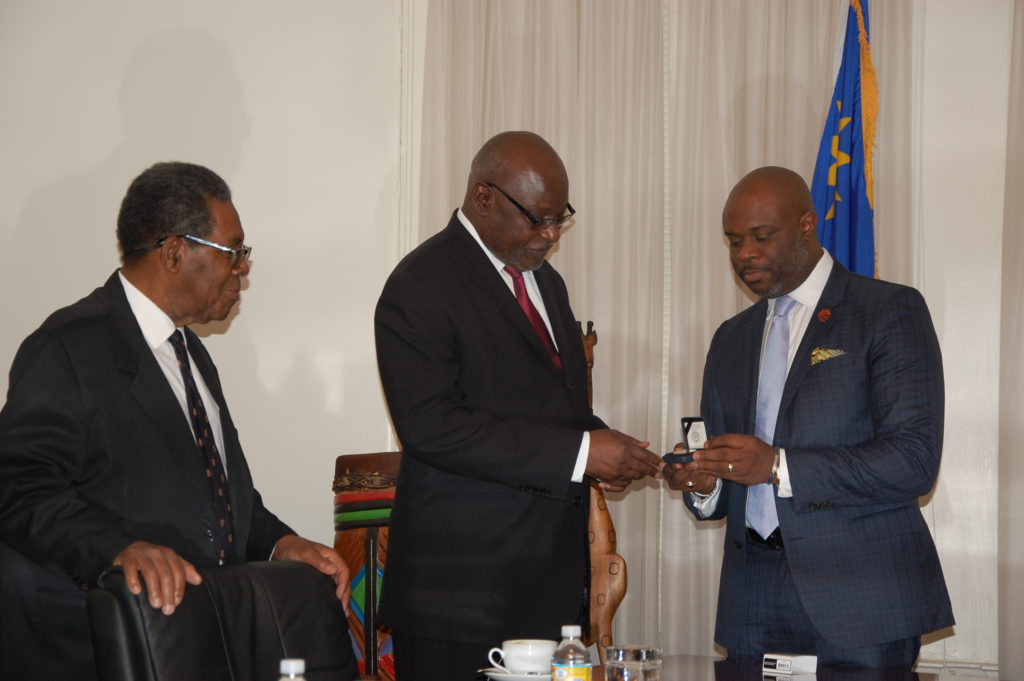
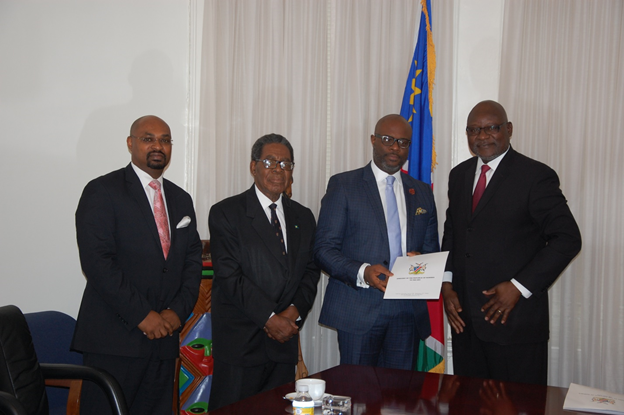
WASHINGTON, D.C. — Mr. Edison Sumner, CEO of The Bahamas Chamber of Commerce, was presented with his credentials as the Honorary Consul for Namibia in The Bahamas by His Excellency Martin Andjaba, Ambassador of the Republic of Namibia to the United States, during a ceremony on Thursday, March 30, at the Embassy of Namibia, 1605 New Hampshire Ave, N.W.
Among those attending the ceremony were His Excellency Dr. Eugene Newry, Bahamas Ambassador to the United States, and Mr. Chet Neymour, Deputy Chief of Mission, Bahamas Embassy.
Ambassador Andjaba noted that having an Honorary Consul in The Bahamas “is a matter we have been discussing for quite sometime,” adding that bi-lateral relations between the two countries “are excellent.”
“At the time when Namibia was struggling for independence, The Bahamas was one of the countries that supported us through the United Nations,” Ambassador Andjaba said. “The fact that Ambassador Newry is here is an indication of the solid bond and friendship between our two countries.”
Declaring that he was honoured “to accept this nomination and commissioning as the Honorary Consul for The Republic of Namibia in The Bahamas,” Mr. Sumner noted that The Bahamas “is a beautiful place, filled with life, color, charm and warmth.”
“The people are incredibly friendly and hospitable, the culture is vibrant and the seven hundred-plus islands and keys that make up the archipelago are some of the most breath-taking spectacles of natural beauty you will ever see and experience,” Bahamas Chamber of Commerce CEO said. “We are a small nation of less than four hundred thousand people, but we are a strong and proud people who are not afraid of hard work. We are progressive and innovative in finding ways to further strengthen our country and economy.”
Notwithstanding the fact that the world is still recovering from the recessions of a decade ago and the challenges faced by many countries, especially in the Caribbean region, Mr. Sumner said The Bahamas “still enjoys having the strongest economy in the Caribbean and one of the strongest economies in the Americas.”
“Not only is The Bahamas a great place to live and work, it is also a great place to invest and do business,” Mr. Sumner said. “With one of the oldest parliamentary democracies in the western hemisphere, political and social stability, advanced information, communications and technology infrastructure, educated and skilled workforce, ideal geographical situation, and a vibrant economy, The Bahamas is ideally situated to attract major, world-class investments such the $4 Billion dollar Baha Mar Resort development, or the $2 Billion dollar Atlantis Paradise Island, and many other very large and impressive developments throughout the country.”
Highlighting the fact that The Bahamas is “a leading international financial centre and home to some of the world’s most recognized financial institutions, including banks and insurance companies,” Mr. Sumner added, “We are a well-established service economy, but we are always looking for ways to improve our service offerings. Excellency, the peoples of Namibia and The Bahamas have many things in common. We are both young nations; we are both members of the Commonwealth of Nations; we are both bordered on one side by the Atlantic Ocean; and we both depend on tourism as a major contributor to our economies, although in Namibia to a lesser degree.”
As Namibia’s Honorary Consul in The Bahamas, Mr. Sumner said he “would wish to explore opportunities for the promotion of investments, education and training, and cultural exchanges between our countries, as I am sure there is much we can learn from each other.”
“Also, considering that tourism is our largest industry, and we do it very well, I am hoping to further explore and promote the opportunities for tourism development between our countries, where we can get more tourists visiting our shores from your country,” Mr. Sumner said. “Please convey my personal highest regards and respect to your President, Dr. Hage Geingob, Vice President Nickey Iyambo and Prime Minister Saar Kuugongelwa- Amandhila. Further, please also accept and convey the profound greetings and best regards from the Government and people of The Bahamas as we consider this partnership here today a very important step in building and strengthening relations with Africa.”
Mr. Sumner added that the Government of The Bahamas “also wished me to extend their appreciation to Namibia for the support you gave them through the African Union for their bid to be a member of the Human Rights council in 2015.”
“Please be assured of my commitment to work on behalf of Namibia to assist in building strong ties between our two countries,” Mr. Sumner said.
Located in Southern Africa, the Republic of Namibia’s western border is the Atlantic Ocean and it shares land borders with Zambia and Angola to the north, Botswana to the east and South Africa to the south and east. It has a population of 2.1 million people and a stable multi-party parliamentary democracy. Agriculture, herding, tourism and the mining industry – including mining for gem diamonds, uranium, gold, silver, and base metals – form the basis of its economy.
CAPTION
Mr. Edison Sumner, CEO of The Bahamas Chamber of Commerce, is pictured being presented with his credentials as the Honorary Consul for Namibia in The Bahamas by His Excellency Martin Andjaba (right), Ambassador of the Republic of Namibia to the United States. At left is Mr. Chet Neymour, Deputy Chief of Mission at The Bahamas Embassy, and second from left is His Excellency Dr. Eugene Newry (second from left), Bahamas Ambassador to the United States.
New York
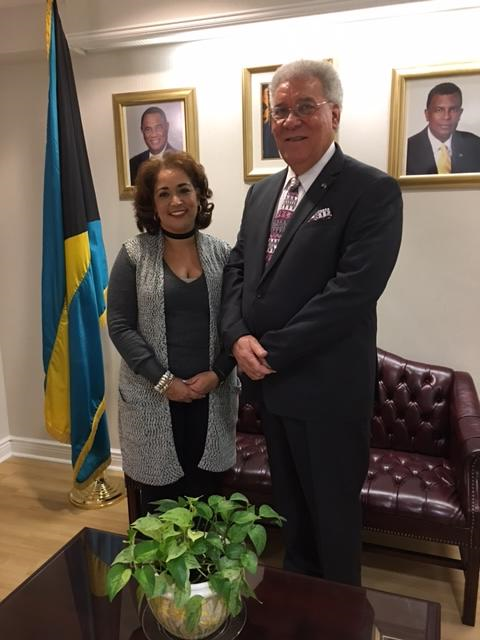
NEW YORK — The Hon. Forrester J Carroll, Bahamas Consul General to New York, was pleasantly surprised on Thursday, March 30, 2017, when Mrs. Leslie Gongora Carroll Heywood, a second cousin who lives in North Carolina, dropped by the Bahamas Consulate, 231 East 46th Street, to introduce herself and to visit him for a while. She is the granddaughter of Mr. Archibald Carroll, a brother of the Consul General’s father. Mr. Archibald Carroll worked for many years as an electrical engineer at the Old British Colonial Hotel (now the Hilton Hotel) in downtown Nassau. Ms. Heywood’s uncle on her mother’s side is Doctor Larry Carroll of Doctor’s Hospital in Nassau. Ms. Heywood is a social worker with Child Welfare Services in Henderson County North Carolina.
New York
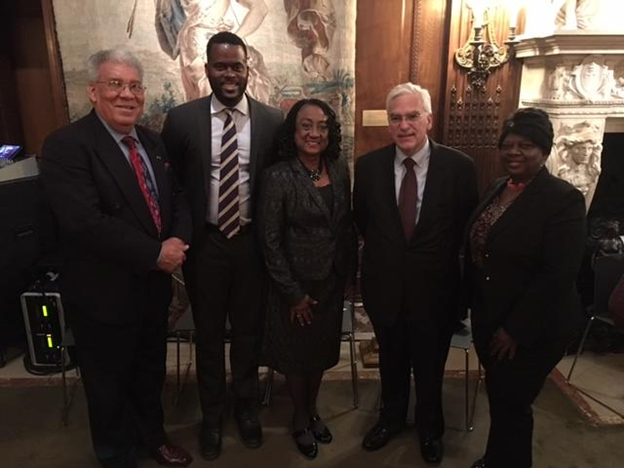
NEW YORK — At the invitation of Manhattan Borough President Gale A Brewer and Commissioner Penny Abeywardena of the New York City’s Mayor’s Office for International Affairs, Consul General Forrester J Carroll and his wife, Dr. Valencia P Carroll, on Monday, March 27, 2017, attended a reception held by the Mayor’s office in honour of the contributions to the City of New York by Consuls General located within the NY City area. Pictured from left: Consul General Carroll; Vice Consul Jeremiah Hyacinth, St Lucia Consulate General; the Hon. Donna Hunt-Cox, Consul General of Barbados; Ambassador Vasilios Philippou D.H.C., High Commissioner of the Republic of Cyprus to New York; and Dr. Carroll.
Washington D C
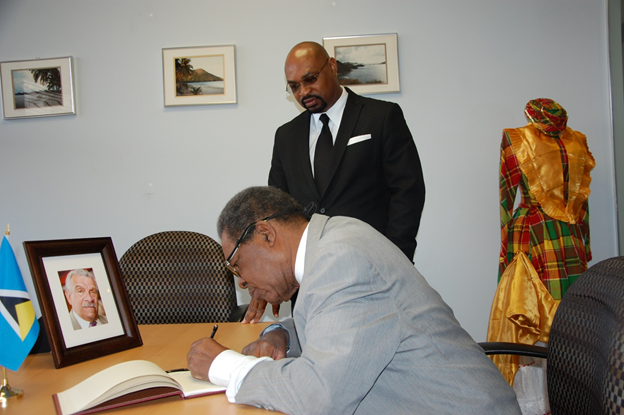
WASHINGTON, D.C. – His Excellency Dr. Eugene Newry, Bahamas Ambassador to the United States, is pictured signing the Book of Condolences for Saint Lucia’s Nobel Laureate for Literature, Sir Derek Alton Walcott, KCSL, OBE, OCC, at the Embassy of St. Lucia, 1629 K Street N.W., Suite 1250, on Monday, March 27, 2017. Sir Derek passed away at his home in Saint Lucia on Friday, March 17, 2017, at the age of 87. Looking on is Mr. Chet Neymour, Deputy Chief of Mission, Bahamas Embassy.
OAS
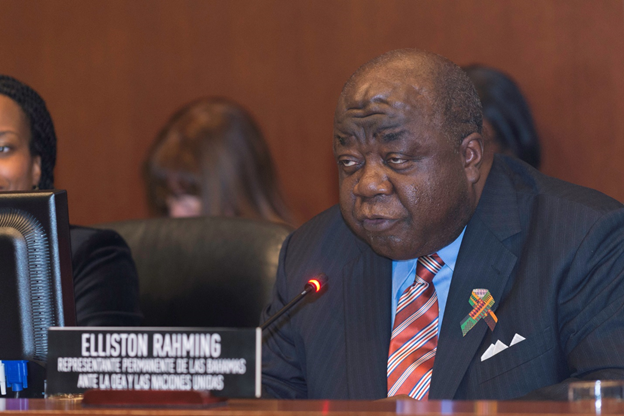
WASHINGTON, D.C. — His Excellency Dr. Elliston Rahming, Bahamas Ambassador and Permanent Representative to the United Nations and the Organization of American States (OAS), made a strong case during an address at the OAS on Wednesday, March 29, 2017, in support of his contention that there “is cause to celebrate the black experience in and contributions to the Americas.”
“And while we celebrate how far we have come from the vestiges of ancient slavery, let us use this decade to dismantle modern slavery in all its ugly forms: forced labor, human trafficking and gender bias,” Dr. Rahming said, adding that it is “only by so doing that we make a recognizable dent in closing our hemisphere’s black hole.”
Dr. Rahming was speaking during a special meeting of the Permanent Council of the OAS convened on Wednesday, March 29, 2017, in Simon Bolivar Hall at the OAS headquarters at 17th Street and Constitution Avenue, N.W. to commemorate the “International Day of Remembrance for the Victims of Slavery and the Transatlantic Slave Trade.”
Using the theme “Closing the Hemispheric Black Hole,” Dr. Rahming said that Carter Goodwin Woodson, the noted African American author and historian, made “the point that throughout recorded history descendants of the African slave trade have been underrepresented and unevenly recognized for their varied and myriad contributions to civilization and what I will call world peace, progress, prosperity, and pleasure.”
“Of the roughly seven billion people who inhabit this planet, 1.5 billion are classified as white and blacks account for 1.1 billion,” Dr. Rahming said. “The remaining 4 billion-plus are somewhere in the middle. Black people, for the most part, live on three continents: Africa and North and South Americas. Throughout history, there is a paucity of written material that records the positive influences and storied contributions that black citizens of the world have made toward global peace, prosperity and pleasure. It is this vacuum, this systematic oversight, that Carter Woodson calls history’s black hole.”
Continuing, Dr. Rahming added, “Having endured slavery; having shaken off the cloak of colonialism; having triumphed over Jim Crow laws in the United States, apartheid in South Africa, slavery throughout most of the diaspora, people of African descent – except for political power – are still far too often near the bottom.
“Despite this, I contend that some of the greatest exploits in human endeavor were spawned from the minds of descendants of the trans-Atlantic slave trade.
“In the Americas, some 200 million persons are of African descent. Many more live elsewhere. Given the protracted ill efforts of slavery and colonialism, the United Nations by General Assembly Resolution 68/237 has declared 2015 to 2024 ‘The International Decade for People of African Descent’. Sadly, this clarion call towards human upliftment has gotten all but lost in the glow of the Millennium and Sustainable Development Goals. I would like to suggest, however, that we utilize our best efforts to celebrate the lives and contributions of those of African descent who contributed significantly to filling history’s black hole through the promotion of peace throughout the Americas. In this regard, let us salute and celebrate the lifetime contributions of:
Samuel Sharpe of Jamaica, whose slave rebellion led to the abolition of slavery not just in Jamaica but throughout the British Empire.
Frederick Douglass, an American who was born into slavery but who went on to become an advisor to Abraham Lincoln.
Harriet Tubman whose ingenious anti-slavery Underground Railroad exploits led to freedom for hundreds of slaves and for which her portrait is soon to adorn the U.S. $50 note.
Benkos Bioho, a former king, who lived in the 16th century in what is now the Democratic Republic of the Congo, who was brought to the West as a slave. He eventually settled in what we know today as Colombia and he was instrumental in bringing about the first slave-free village in the Americas.
Benedita da Silva of Brazil, who was born in the slums, overcame entrenched and intense prejudice because she was a woman and because she was black, yet she rose from utter poverty to become the first female and the first black governor of the state of Rio de Janeiro.
Marcus Garvey, a Jamaican national, who perhaps did more than anyone else in his day to teach love of self and economic independence among people of African descent.
George Padmore, who hailed from Trinidad and Tobago, who was among the first to introduce trade unionism and collective bargaining to the Soviet Union in the 1930s.
Dr. Martin Luther King Jr., who was to the West what Ghandi was to the East – a symbol of mankind’s nobler virtues exemplified by the predominance of reconciliation and understanding over hatred and callous indifference.
Toussaint L’Ouverture from Haiti, who proved to be a military genius and is credited with liberating not just Haiti but also what is now the Dominican Republic.
A.N.R. Robinson, former Prime Minister and President of Trinidad and Tobago, whose vision and indefatigable efforts led to the creation of the International Criminal Court in the Netherlands.
Colin Powell, of Jamaican heritage, who was the United States’ first black Secretary of State and National Security Advisor and whose war doctrine has become the international template on how to reduce civilian casualties in war zones.
Barack Obama, the 44th President of the United States, who perhaps above and beyond everything else, proved that it is possible to govern even in hostile envisions, free from personal or institutional scandals.”
With respect to progress within the Americas and the contributions of people of African descent, Dr. Rahming said that “we need look no further than how all of us, without exception, have a descendant of slavery to thank for many of life’s comforts we so easily take for granted.”
Continuing he listed a litany of examples of accomplishments by blacks:
“If you find that bleach, instant coffee, mayonnaise, ink, shaving cream, meat tenderizer, and shoe polish are important to you, thank black inventions pioneer, George Washington Carver.
“If you enjoy potato chips, thank black inventor George Crum.
“If you know someone who has had open heart surgery or if one day you require one, thank black medical pioneer Dr. Daniel Hale Williams.
“If you enjoy the design and layout of this city, Washington, D.C., or if you have become reliant on your watch to help manage your time, thank Benjamin Banneker.
“Do you take your suits and dresses to be dry cleaned? Give a shout out to Thomas Jennings, a black man, who in 1821 was the first to receive a patent for dry cleaning.
“When you go to bed tonight if you turn off a lamp, black inventor Lewis Latimer, who worked with Thomas Edison, holds the original patent for the electric lamp.
“Garret Morgan, a descendant of slaves, invented the traffic light and the sewing machine; Frederick McKinley Jones invented the x-ray machine as well as the automatic refrigeration system for trucks that allow perishable goods to travel long distances; Marie Van Brittan Brown was the first to develop the modern home surveillance and security system; Shirley Ann Jackson’s pioneering research led to the inventions of the fiber optic cable, portable fax machine and the touchtone telephone; Mark Dean conceived and developed the colored PC monitor.”
Dr. Rahming added, “And so we have looked however briefly at how descendants of slavery contributed to peace and progress throughout the Americas. I therefore now turn to my third “P” – pleasure. In what ways have descendants of slaves contributed to our level of pleasure throughout the Americas. In the interest of time I will cite just two categories of pleasure from which we have all benefitted: music and sports.
“What would our world be without reggae and Bob Marley? Imagine a world without the Mighty Sparrow. But there’s not just reggae and soca that are outflows of the African experience, there’s also jazz, the blues, gospel, rhythm and blues, rap, rock and roll and soul music – all of which can be traced back to the Motherland and all of which have infused millions of hearts irrespective of race or language with a sense of hope, happiness, love, endurance and survival. So while Bob Marley is immortal, and while the Mighty Sparrow is eternal, we must pause every now and then to salute Michael Jackson, Nat King Cole, Ella Fitzgerald, Duke Ellington, Otis Redding, Percy Sledge, Whitney Houston, Byron Lee, Harry Belafonte, Aretha Franklin, Celia Cruz, Josephine Baker and countless others who contributed to our joyful tears, teenage romantic moments and can-do spirit.
“Finally, as a source of pleasure, descendants of slavery have used the instrument of sports to warm our collective hearts, knit us together and lift our spirits during our deepest, darkest hours.
“If you like boxing, there were none greater than Joe Louis and Mohammed Ali; if you prefer basketball, you may wish to know that blacks make up 75% of the players in the National Basketball Association. Pleasure!
“If you like American football, 70% of NFL players are black. PLEASURE! If you like soccer, as I do, Pele, thirty plus years after retirement, still has no equal, not in all of Europe or Asia or wherever. If you are partial to cricket, Sir Gary Sobers is still the standard bearer of excellence. And I would be remiss not to mention track and field and the pride we all felt by the unmatched achievements of Jesse Owens, Carl Lewis, Jackie Joyner Kersee, and yes, Usain Bolt. Indeed time would not permit me to comment on Tiger Woods in golf or the Williams sisters in tennis.
“It is therefore for these and countless other reasons, Mr. Chairman, that I say while there is much work to be done, and still much land to be possessed, there is cause to celebrate the black experience in and contributions to the Americas. And while we celebrate how far we have come from the vestiges of ancient slavery, let us use this decade to dismantle modern slavery in all its ugly forms: forced labor, human trafficking and gender bias. It is only by so doing that we make a recognizable dent in closing our hemisphere’s black hole.”
CAPTION
Dr. Elliston Rahming, Bahamas Ambassador and Permanent Representative to the United Nations and the Organization of American States (OAS), addressing a special meeting of the OAS Permanent Council on Wednesday.
Washington D C
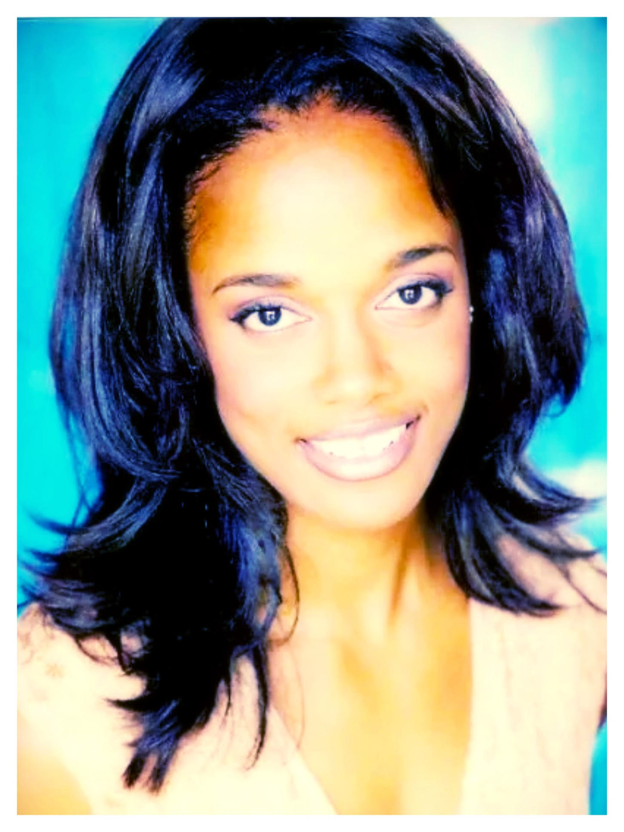

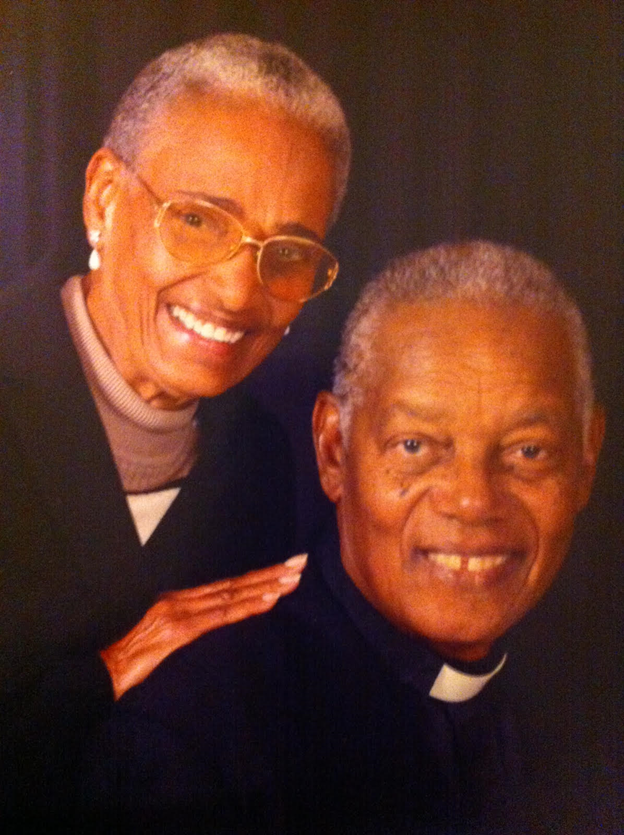
By OSWALD T. BROWN
WASHINGTON, D.C. — Back in the 1990s when The Bahamas was on the cusp of becoming internationally acclaimed in track and field, one of its standout performers was long jumper Jackie Edwards. In fact, it may be more accurate to say that Jackie was among the elite Bahamian athletes who helped to establish The Bahamas as one of the world’s current track and field superpowers.
A five-time Olympian, Jackie first represented The Bahamas in the Olympics in 1992 and subsequently in 1996, 2000, 2004 and 2008. Despite noteworthy performances each year, she never won a medal at this level, but her stellar track and field career includes being a two-time NCAA Champion (Indoors and Outdoors) and five-time All-American while attending Stanford University in California; Commonwealth Games Silver Medalist 1998 and finalist in 1994, 2002 and 2006; Pan American Games Bronze Medalist in 1995 and Silver Medalist 2003 as well as a Finalist in 2007.
Additionally, she was a record nine-time World Championship competitor and three-time finalist in 1991, 1995 and 2005 as well as a Silver Medalists in 1999 and 2003 in the Central American and Caribbean Championships and a Bronze Medalist in 2005.
Over the years, she has also competed for The Bahamas as a professional Track and Field athlete on the International track circuit throughout Europe, Asia, the Caribbean, South America and the United States.
Today Jackie lives in Los Angeles, California, where the experience she accumulated in track and field is the foundation for a multi-faceted career. She is currently a Personal Trainer and High School Track Coach and last year she co-founded a company called Tootsies Brand, LLC , which she describes as “a fun and fashionable line of compression socks specifically branded for the maternity market.”
“We recently landed a very coveted deal with the largest chain of maternity store in the United States, with over 1000 stores nationwide,” Jackie says. “I am extremely excited about this opportunity and the potential for growth for the company. My business partner and boyfriend of two years is Dr. Ross Flowers. He is a UCLA graduate, a PAC-10 Champion in the 110 hurdles and he is the Sports Psychologist for the players and coaches of the Los Angeles Clippers NBA basketball team.”
Jackie is also a motivational speaker, with speaking engagements ranging from health conventions, to underprivileged youth events, Rotary Clubs, high schools, and women’s fora. She is a member of the LA Chapter of the National Sales Network and one of six panelists invited to speak at its 2015 Successful Women in Business and Sales Seminar.
With substantial experience interacting with diverse ethnic and cultural groups, having traveled to 56 countries, Jackie was employed for 11 years, from 1998 to 2009 by The Bahamas Ministry of Youth, Sports and Culture as a Sports Ambassador.
Jackie actually was born in Jamaica, but she was brought to The Bahamas by her parents when she was seven years old after her father Rev. Dr. Nymphas R. Edwards, a Methodist Minister, was appointed Pastor of Wesley Methodist Church in Nassau. He subsequently served as Pastor of Trinity Methodist Church and St. Michael’s in Nassau and St. Paul’s in Freeport. Her mother, Mrs. Lois Edwards, was an Executive Secretary.
She attended Queen’s College (Primary and High School) and describes growing up in The Bahamas as “an amazing experience.”
“As a child, I didn’t even realize how small the island of New Providence was until I left to go to college,” Jackie says. “My childhood formed the foundation for who I am as a person spiritually and morally and still grounds me to this day. When I think of my favorite foods, things I like to do and places I like to go, in spite of the fact that I’ve traveled to over 50 countries, I still come right back to The Bahamas, my years growing up and the lifelong friendships there that I still cherish. I love the pace of life, the landscape and the sense of connectedness to everyone. It is truly unparalleled.”
Jackie left The Bahamas in 1988 at the age of 17 to attend Stanford University in Palo Alto, California, from where she graduated in 1992 with a B.A. in Psychology. She subsequently obtained an M.A. in Sport Psychology from John F. Kennedy University, Orinda, California, in 2001 and was Certified as a Personal Trainer by the National Academy of Sports Medicine in 2011.
Asked who are some of her family members in The Bahamas, Jackie said, “I do not have any immediate family members still living there. My parents moved to the US to be near me shortly after my graduation from college. They are planning to move back to The Bahamas, hopefully later this year. My brother, Dr. John Edwards, did a part of his medical residency at Princess Margaret Hospital and so he was back there during those years.”
Jackie noted that during the 17 years and five Olympic Games that she competed as a professional athlete for The Bahamas, she used to “go home about three times a year.”
“Now that I’ve retired, I try to make it once a year or so,” she said. “I am planning to go home in April of this year, as I did two years ago, as a volunteer at the upcoming World Relay Championships of Track & Field that are going to be held in Nassau.”
Oswald T. Brown is the Press, Cultural Affairs and Information Manager with The Bahamas Embassy in Washington, D.C.
CAPTION ONE
Jackie Edwards currently lives in Los Angeles, California, where the experience she accumulated in track and field is the foundation for a multi-faceted career.
CAPTION TWO
A five-time Olympian, Jackie Edwards is one of the elite Bahamian athletes who helped to establish The Bahamas as one of the world’s current superpowers in track and field.
CAPTION THREE
Jackie’s parents, Rev. Dr. Nymphas R. Edwards, a Methodist Minister, and Mrs. Lois Edwards brought her to The Bahamas from Jamaica when she was seven years old.
